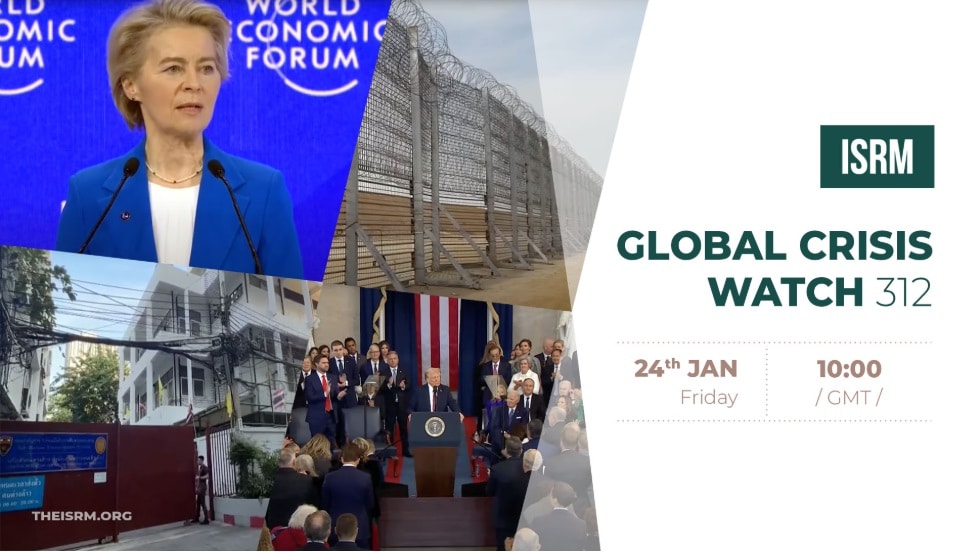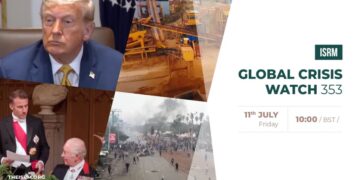The Institute of Strategic Risk Management (ISRM) has announced its latest Global Crisis Watch, number 312, which this week will cover Trump’s first week in office and his reshaping of domestic and foreign policy, the EU, Panama, and China pushing back against US tariffs, Israel’s ‘Iron Wall’ in Jenin, and international pressure mounting on Thailand over Uyghur deportation risks. It takes place tomorrow, Friday January 24 at 10am, GMT. Read more about the topics below.
America First in Action: Trump’s reshaping of domestic and foreign policy
The start of President Donald Trump’s second term has been marked by sweeping policy changes, fulfilling his campaign promises while advancing a broad conservative agenda.
His administration declared a national emergency at the southern border, reinstating strict immigration measures, including the “Remain in Mexico” policy, halting refugee admissions, redefining birthright citizenship and increasing military involvement in border enforcement. Trump also targeted criminal cartels, seeking to designate them as terrorist organizations, while working to cut funding for sanctuary cities and NGOs supporting undocumented immigrants.
Trump moved to eliminate federal diversity, equity and inclusion (DEI) programs, revoked Biden-era racial equity and LGBTQ protections and limited gender recognition to male and female on federal documents. He also ordered the freezing of federal hiring, except for essential roles, and reinstated policies making it easier to fire civil service employees.
In the energy sector, Trump declared a “national energy emergency” to prioritize fossil fuel production, withdrew from the Paris climate agreement and rolled back policies supporting renewable energy and electric vehicles. He also resumed the process of withdrawing from the World Health Organization (WHO) and implemented reviews of US foreign aid under “America First” policies.
In terms of justice, Trump pardoned over 1,500 individuals involved in the January 6th Capitol attack and directed investigations into alleged Biden-era abuses of power. His administration also explored reversing Biden’s healthcare initiatives while maintaining congressional caps on insulin prices.
These actions reflect Trump’s consolidation of executive power and his push to implement a conservative agenda, while critics voice concerns about their potential impact on civil rights and constitutional principles.
EU, Panama and China push back against US tariffs, Putin eyes US relations
The European Union has vowed to defend its economic interests if the US imposes tariffs under President Trump’s “America First” agenda. Speaking at the World Economic Forum in Davos, EU Commissioner Valdis Dombrovskis highlighted Europe’s readiness to respond proportionally to safeguard its values and rights. Trump recently reiterated his intention to impose tariffs on EU goods, describing the bloc as “very, very bad” to the US, and hinted at further tariffs on Chinese imports starting in February.
European Commission President Ursula von der Leyen called for pragmatism while emphasizing the EU’s commitment to protecting its strategic interests. In her Davos speech, she reaffirmed the importance of maintaining the world’s largest trade partnership between the EU and the US, warning that global economic fragmentation could reduce GDP by up to 7%. Von der Leyen also underlined the EU’s resolve to support Ukraine regardless of US policy shifts, stressing that Ukraine’s independence is non-negotiable.
Both leaders acknowledged the global risks posed by escalating trade conflicts, including damage to economic growth and supply chain disruptions. Despite tensions, the EU aims to collaborate with the US on shared interests while countering unfair practices from rivals like China. Von der Leyen framed the EU’s approach as one of adaptability, striving to balance defending its values with seeking new economic opportunities in a changing global landscape.
Russian President Vladimir Putin welcomed Donald Trump’s return to office, praising his intent to restore US-Russia ties and prevent World War III. Putin blamed prior tensions on the Biden administration, while failing to mention his 2022 invasion of Ukraine, which severely strained relations. Trump has indicated a willingness to meet with Putin but remains uncertain about Putin’s commitment to peace. Ukrainian President Volodymyr Zelenskyy has expressed hope for collaboration with the US under Trump to achieve lasting peace. Meanwhile, Russia and Ukraine continue active conflict, including drone exchanges targeting critical infrastructure.
Separately, Panama and China have pushed back against Trump’s claims over the Panama Canal. Trump suggested that China effectively controls the canal and hinted at potential US military action to reclaim it, a claim dismissed by Panama’s President José Raúl Mulino, who emphasized the canal’s sovereignty.
Panama lodged a formal complaint with the UN, citing the US president’s remarks as a violation of international law. China has denied involvement in canal operations, aligning with Panama’s neutrality principles.
Escalating geopolitical tensions are evident in these developments, ranging from US-Russia relations and the Ukraine conflict to global trade route disputes, reflecting wider struggles for influence and sovereignty.
Israel launches ‘Iron Wall’ operation in Jenin, targeting militants amid civilian casualties
Following a Gaza ceasefire, Israel launched a large-scale military operation called ‘Iron Wall’ in the West Bank city of Jenin, targeting what it describes as militant strongholds.
Israeli airstrikes and ground forces, including armored vehicles and bulldozers, surrounded the Jenin refugee camp, reportedly killing at least 10 Palestinians, including a child, and injuring 40 others. The Palestinian Health Ministry confirmed civilian casualties, while reports indicate ambulances were blocked from entering the area. Videos suggest some of the deceased were unarmed civilians.
Israeli Prime Minister Benjamin Netanyahu stated the operation aims to dismantle “terror infrastructure.” Defense Minister Israel Katz highlighted lessons learned from the recent Gaza war, emphasizing a sustained approach to prevent militant resurgence. However, critics argue that this operation represents collective punishment and a step toward annexing parts of the West Bank, a claim supported by increased settler violence and the destruction of Palestinian property.
Palestinian factions, including Hamas and Islamic Jihad, have called for intensified resistance in the West Bank. The Palestinian Authority denounced the operation as part of a broader strategy to consolidate Israeli occupation. Meanwhile, Israel has accused Iran of arming militant groups in the region.
International responses remain divided. While the UN has condemned settler violence and escalating hostilities, recent shifts in US policy – particularly the removal of sanctions on settlers – have further complicated diplomatic efforts.
International pressure mounts on Thailand over Uyghur deportation risks
The United Nations has called on Thailand to stop the deportation of 48 Uyghur men held in detention in Bangkok since 2014, warning they face a significant risk of torture and other inhumane treatment if returned to China. These men, part of a group that fled China to escape persecution, are part of a larger Uyghur community from Xinjiang, a region where China has been accused of committing genocide through arbitrary detention, forced labor and mass surveillance. Human rights groups, including Human Rights Watch, have repeatedly condemned China’s actions, citing widespread abuses against Uyghur Muslims.
The detainees, who are in poor health, have reportedly been on hunger strike since January 10, protesting against their potential deportation. The Thai government has denied plans to send them back, but international pressure is mounting, with prominent figures, including US Secretary of State Marco Rubio, advocating for their release. UN experts emphasize that Thailand must ensure the men’s access to asylum procedures and proper medical care, as half of them suffer from serious health issues like diabetes and kidney dysfunction.
Thailand’s previous deportation of Uyghurs in 2015 led to global condemnation, and the fate of those returned to China remains unknown. International human rights bodies warn that if deported, these men could face enforced disappearances, torture and long-term imprisonment. While Thai authorities have assured the UN that no deportation is imminent, concerns persist about their safety and future.
Register here
For more ISRM news, click here






